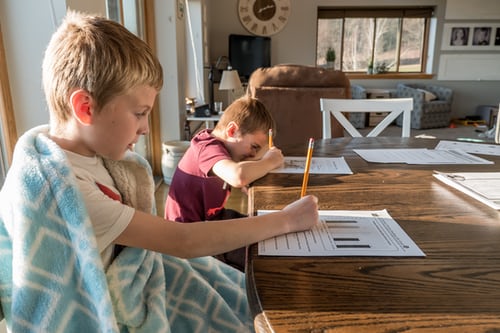Here we go again…or do we? Is it the same as last time or have we learned our seven homeschooling lessons from lockdown in the spring summer of 2020? I have three boys working from home, in years 13, 10 and 6. Keeping a harmonious household certainly has its challenges: finding a space to work; sharing electronic devices; using broadband at the same time and this doesn’t include the constant round of meals and dishwashing.
However, there are small but significant changes this time. Most of the high school lessons are live. I go from room to room, moving from Physics A level to GCSE Music, with the teacher expertly asking on the spot questions to make sure my son is still listening. The teenagers have to be out of bed and in position by 8.30am ready to start the day. The primary provision is a combination of powerpoints with voiceovers, set work and live zoom assemblies. It offers some flexibility which suits parents who need to be on hand to supervise and fit it around their own work.
I mentor students through their GCSE and A level studies with Student Navigator. During lockdown I change how I see my students, switching to weekly drop-ins, remotely checking in to monitor progress, motivation, quality of work and general mood. I adopted this pattern last lockdown and it proved very effective for the students both during lockdown and once they returned to school. These experiences have taught me seven homeschooling lessons from lockdown.
The seven homeschooling lessons from lockdown
- Routine School provides a regular routine for young people and without school this can very easily slip. More live lessons have definitely helped with getting into a good routine and having to get up early supports a healthy sleep routine. If your child hasn’t got live lessons, try to get them to follow their normal timetable as that is a tried and tested routine. Routine provides structure to the day and gives us a time to work, relax and rest and helps with our …
- Mental Health The most worrying aspect of lockdown is the effect it has on the mental health of our young people and children. February sees Childrens Mental Health Week where the theme this year is “express yourself”. This can be done creatively through art but also by making time for listening and asking questions and if necessary seeking help.
- Interaction No matter how good the remote provision is, it doesn’t make up for the hundreds of interactions that take place every school day with friends, class mates and teachers. Studying at home can be extremely isolating so encourage your children to maintain their social networks as much as is possible. This might mean talking to friends via zoom, meeting a friend for a walk, asking the teachers questions, having a ‘study buddy’… someone to talk about work with.
- Exercise and fresh air are vital for staying healthy physically and mentally. During the first lockdown when there were less live lessons and the days were long and the weather glorious, it was easy to get outside to play, walk, run or cycle. In this winter lockdown with shorter days and full days of live lessons, it is harder to exercise. However, try to find time in the day for exercise and incorporate it into your daily routine.
- Keep up with the work during lockdown. Staying on top of your school work provides a sense of satisfaction, a goal to aim for and lifts any concerns about returning to school.
- Screens and the amount of time spent on them is the hardest issue for parents and children because they are necessary for learning and socialising. Anything that can lessen the time is good. Build in a screen free time every day and lead by example, doing something else: exercise, craft, art. Have a screen free lunch break and encourage short breaks between lessons if possible.
- “Variety is the spice of life” and in lockdown, one day starts to appear remarkably similar to the next. Encourage new hobbies and projects: baking, crafts, ballroom dancing, photography or learning a language. All these will add variety to the day and are educational. Introduce themed family evenings: games night, quiz evenings, movie nights, which will break up the week.
Lockdown is hard for everyone. I have yet to find a child who prefers homeschooling to being in school. It will end and when that day comes, our hope is that our children can return to school as unscathed as possible. At www.studentnavigator.co.uk we mentor young people as well as offering academic and career coaching. Please contact us our website to see how our resources and services can help you through lockdown.

